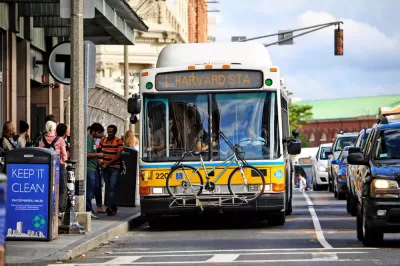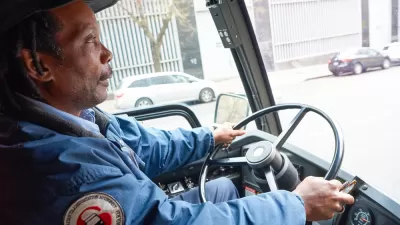The city's new mayor wants to see fare-free transit funded as a public good throughout the Boston region.

If its new mayor gets her way, Boston could soon have fare-free bus travel for everyone, reports Joanna Slater. "Michelle Wu, the city’s newly elected mayor, has made free public transportation a rallying cry and a personal mission, calling it a tool for social justice and tackling climate change."
"Advocates for free transportation say it increases ridership, discourages car use and provides greater access to jobs and education, particularly for lower-income residents and communities of color." Some proponents of free transit say eliminating fares also reduces operating costs. "Noah Berger, the [Merrimack Valley Regional Transit Authority]’s administrator, said that for every dollar the system collected in fares, 76 cents went to the costs of collecting those fares — from fixing and maintaining fare boxes to physically counting cash."
"Fare-free pilots can be more complex than they appear, said Steven Poftak, general manager of the MBTA. When fares disappear for a bus, they must also be eliminated for transit services for people with disabilities in the same area, generating more demand for such rides." Meanwhile, in Boston's early fare-free pilot, "About two-thirds of the passengers said the free bus service didn’t save them any money, either because they use a monthly transit pass or because they transfer from the bus to a train and must still pay a fare for their journey."
But Wu wants to see fare-free transit spread throughout the greater Boston region. "In the long run, she said, public transportation is 'a public good and should be funded that way.'"
FULL STORY: Are free buses a tool for social justice? Boston wants to find out.

Planetizen Federal Action Tracker
A weekly monitor of how Trump’s orders and actions are impacting planners and planning in America.

Congressman Proposes Bill to Rename DC Metro “Trump Train”
The Make Autorail Great Again Act would withhold federal funding to the system until the Washington Metropolitan Area Transit Authority (WMATA), rebrands as the Washington Metropolitan Authority for Greater Access (WMAGA).

The Simple Legislative Tool Transforming Vacant Downtowns
In California, Michigan and Georgia, an easy win is bringing dollars — and delight — back to city centers.

The Small South Asian Republic Going all in on EVs
Thanks to one simple policy change less than five years ago, 65% of new cars in this Himalayan country are now electric.

DC Backpedals on Bike Lane Protection, Swaps Barriers for Paint
Citing aesthetic concerns, the city is removing the concrete barriers and flexposts that once separated Arizona Avenue cyclists from motor vehicles.

In These Cities, Most New Housing is Under 441 Square Feet
With loosened restrictions on “micro-housing,” tiny units now make up as much as 66% of newly constructed housing.
Urban Design for Planners 1: Software Tools
This six-course series explores essential urban design concepts using open source software and equips planners with the tools they need to participate fully in the urban design process.
Planning for Universal Design
Learn the tools for implementing Universal Design in planning regulations.
Smith Gee Studio
City of Charlotte
City of Camden Redevelopment Agency
City of Astoria
Transportation Research & Education Center (TREC) at Portland State University
US High Speed Rail Association
City of Camden Redevelopment Agency
Municipality of Princeton (NJ)





























